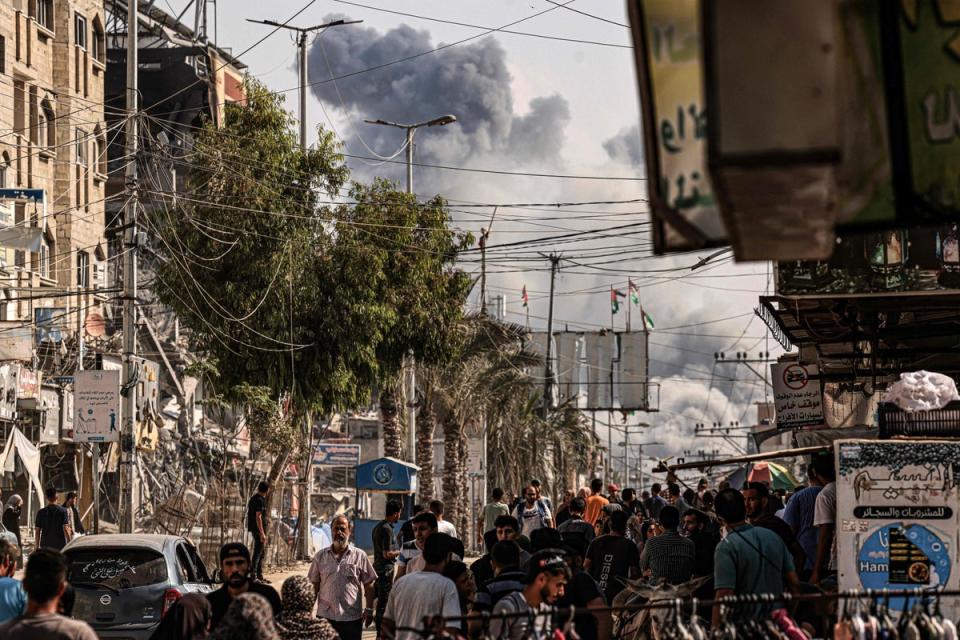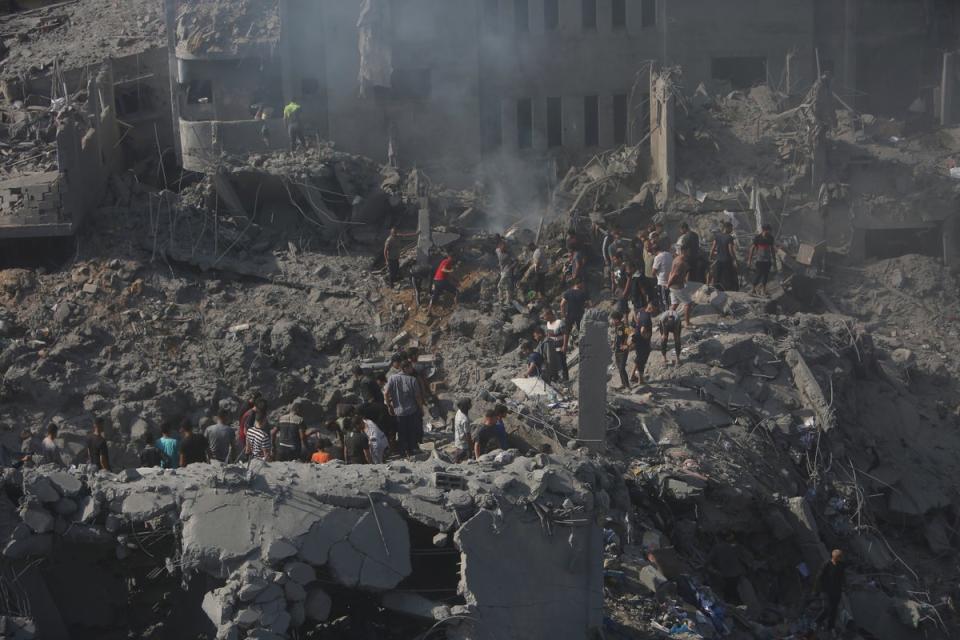Israel’s troops in Gaza City as Netanyahu says his nation’s forces at ‘height of battle’
The head of the Israeli military has said his country’s forces are surrounding Gaza City, with troops also operating inside the besieged territory’s largest city.
“We have advanced another significant stage in the war [with Hamas],” Lieutenant General Herzi Halevi, the Israeli army’s chief of staff, said. “The forces are in the heart of northern Gaza, operating in Gaza City, surrounding it, and deepening [the ground offensive].”
Echoing Lt Gen Halevi, Israeli Prime Minister Benjamin Netanyahu said troops were “at the height of the battle” with Hamas and were “advancing”.
“We’ve passed the outskirts of Gaza City. We are advancing,” he said. Military officials had said that troops were conducting “face-to-face” battles with Hamas militants.
Israel has imposed a total siege and launched its heaviest bombardment ever on Gaza in retaliation for the 7 October attack on southern Israel by Hamas militants who killed 1,400 people and took more than 200 people including British citizens, hostage.
Israel kept up those airstrikes on Thursday, with the UN’s Palestinian refugee agency saying that four of its shelters had been struck in the previous 24 hours, shelters which have hosted nearly 20,000 people combined. “Today, a school-turned shelter was damaged at the Jabalia refugee camp... reportedly killing at least 20 people and injuring five. This comes after two days of heavy bombardments in the area. Earlier today, another school at Beach [Al-Shati] refugee camp was also damaged, with one child reportedly killed. Both locations are in the north of the Gaza Strip,” the agency said.
“Further south, two schools-turned-shelters in the Al Bureij refugee camp were hit. Two people were reportedly killed and 31 injured.’’

According to the health ministry in Hamas-run Gaza, the Israeli bombardment has killed at least 9,061 people, including 3,760 children and 2,326 women.
A group of UN experts repeated calls on Thursday for a humanitarian ceasefire in Gaza, saying time was running out for Palestinian people there.
“We remain convinced that the Palestinian people are at grave risk of genocide,” the group of experts, made up of seven UN special rapporteurs, said in a statement. “We demand a humanitarian ceasefire to ensure that aid reaches those who need it the most.”
The Israeli mission to the UN in Geneva called the comments “deplorable and deeply concerning” and blamed Hamas for civilian deaths, saying the “current war was brought upon Israel by Hamas”.
Arab countries, including those allied with the US and at peace with Israel, have expressed mounting unease with the war. Jordan recalled its ambassador from Israel and told Israel’s envoy to remain out of the country until there’s a halt to the war and the “humanitarian catastrophe” it is causing. Bahrain said on Thursday that the Gulf state’s ambassador to Israel had returned home and the Israeli ambassador in Manama had left the kingdom “a while ago”. Israel had earlier claimed it received no word of any such actions, saying its relations with Bahrain were “stable”.

In Gaza, the health ministry said Thursday they were just hours away from shutting down the main electrical generators in both the Shifa Medical Complex and the Indonesian Hospital because of crippling generator fuel shortages. The two medical centres are among the largest in Gaza and are dealing with the injuries from Tuesday’s Israeli strike on Jabalia refugee camp, which the health ministry said had killed and wounded hundreds of people. Israeli officials said the bombing had killed senior Hamas commanders who sought to shield behind civilians.
Israel has permitted just over 250 trucks of aid to enter Gaza from Egypt but has rejected the delivery of diesel for generators saying it risks being used to power rockets to fire at Israel.
The Israeli military have repeatedly denied there is a humanitarian crisis in Gaza, and told reporters on Wednesday night Hamas had enough fuel to restock hospitals but chose not to. Senior officials told The Independent there were no food shortages and Israel had opened two water pipes to Gaza to allow the delivery of water.
But the aid deliveries into Gaza are too small and not able to reach the north of the country, UN officials have said.
Dr Marwan al-Sultan, a director at the Indonesian Hospital, told The Independent that crippling shortages meant the main generator in his hospital would shut down in hours and they would have to close operating theatres. He said that between the Indonesian and Shifa hospitals there are concerns for dozens of infants under life support in incubators, and hundreds of patients with kidney failure.
“It is very complex situation we had three attacks in just 24 hours, and we have received huge number of injured and the dead, mostly women and children. There are lot of critically injured, including those needing amputations. Almost all of them need an intensive care unit which needs fuel,” he added.
The US secretary of state, Antony Blinken, before leaving for the Middle East on Thursday, said he would discuss concrete steps to minimise harm to civilians in Gaza, after saying earlier they were bearing the brunt of the conflict. The White House has said it is exploring the idea of pauses in the Israel-Hamas conflict to help civilians in Gaza. Any such temporary pause would not stop Israel from defending itself, said national security spokesperson John Kirby.
“What we’re trying to do is explore the idea of as many pauses as might be necessary to continue to get aid out and to continue to work to get people out safely, including hostages,” he said.
The US is among the nations concerned by the threat of the Israel-Hamas war becoming a wider conflict. Lebanon’s Hezbollah said on Thursday it had mounted multiple strikes on Israeli army positions including explosive drones, and Israel launched air strikes on southern Lebanon in a sharp escalation of violence.
Iran-backed Hezbollah has been exchanging fire with Israeli forces across the Israeli-Lebanese border for weeks. In an apparent warning to Hezbollah, Lt Gen Halevi said that “less than half the Israeli air force” was involved in airstrikes on Gaza with “most of its force ready, with bombs loaded should the need arise to attack on other fronts”.

